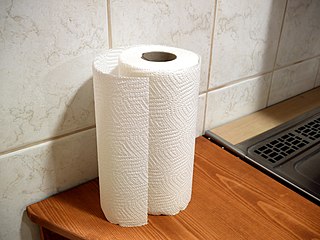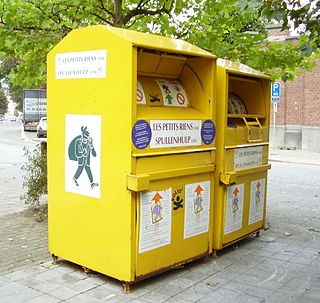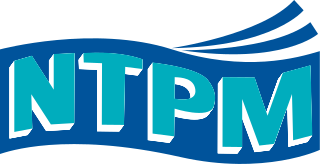
Georgia-Pacific LLC is an American pulp and paper company based in Atlanta, Georgia, and is one of the world's largest manufacturers and distributors of tissue, pulp, paper, toilet and paper towel dispensers, packaging, building products and related chemicals, and other forest products—largely made from its own timber. Since 2005, it has been an independently operated and managed subsidiary of Koch Industries. As of fall 2019, the company employed more than 35,000 people at more than 180 locations in North America, South America and Europe.

A paper towel is an absorbent, disposable towel made from paper. In Commonwealth English, paper towels for kitchen use are also known as kitchen rolls, kitchen paper, or kitchen towels. For home use, paper towels are usually sold in a roll of perforated sheets, but some are sold in stacks of pre-cut and pre-folded layers for use in paper-towel dispensers. Unlike cloth towels, paper towels are disposable and intended to be used only once. Paper towels absorb water because they are loosely woven, which enables water to travel between the fibers, even against gravity. They have similar purposes to conventional towels, such as drying hands, wiping windows and other surfaces, dusting, and cleaning up spills. Paper towel dispensers are commonly used in toilet facilities shared by many people, as they are often considered more hygienic than hot-air hand dryers or shared cloth towels.

Cascades Inc. is a Canadian company that produces, converts, and markets packaging and tissue products composed mainly of recycled fibres. Cascades employs more than 11,700 people in more than 85 operating units in North America. It was founded in 1964.

Tissue paper or simply tissue is a lightweight paper or light crêpe paper. Tissue can be made from recycled paper pulp on a paper machine.

Textile recycling is the process of recovering fiber, yarn, or fabric and reprocessing the material into new, useful products. Textile waste is split into pre-consumer and post-consumer waste and is sorted into five different categories derived from a pyramid model. Textiles can be either reused or mechanically/chemically recycled.

Grigeo AB - the only paper and wood industry company group in Lithuania, and one of the biggest in the Baltic states. The group comprises the following companies: Grigeo AB, Grigeo Packaging UAB, Grigeo Klaipėda AB, Grigeo Baltwood UAB, Grigeo Recycling UAB, Grigeo Recycling SIA, and Mena Pak AT. Grigeo AB is situated at 10 Vilniaus str, in Grigiškės, next to the A1 Vilnius-Kaunas-Klaipėda highway.

Irving Tissue Company Limited is a tissue products producing company, owned by J.D. Irving Limited. It has manufacturing locations in both Canada and the United States.
Tree-free paper, also known as no tree paper, offers an alternative to traditional wood-pulp paper due to its unique raw material composition. This type of paper is considered more eco-friendly especially when evaluating its entire life cycle.
The Tasman Mill site is a pulp and paper mill located on Fletcher Avenue just outside the town of Kawerau in New Zealand. The Tasman Mill site is the largest single employer in the Eastern Bay of Plenty region. Three pulp or paper companies previously operated in Kawerau: Norske Skog operated the mechanical pulp mill and newsprint paper mill; Oji Fibre Solutions, formerly Carter Holt Harvey, operated the kraft pulp mill; and SCA who manufacture tissue and base paper.
Kruger Inc. is a Canadian private company which manufactures publication papers, lumber and other wood products, corrugated cartons from recycled fibres, green and renewable energy, and wines and spirits. Kruger Inc. operates facilities in Québec, Ontario, British Columbia, Newfoundland and Labrador, and the United States. KP Tissue, Inc. is a separate, publicly traded holding company, headquartered in Mississauga, Ontario, Canada.

Körber AG is a strategic management holding company based in Hamburg. In 2023, the group had more than 12,000 employees at more than 100 locations worldwide and generated sales of €2.9 billion.

The environmental impact of paper are significant, which has led to changes in industry and behaviour at both business and personal levels. With the use of modern technology such as the printing press and the highly mechanized harvesting of wood, disposable paper became a relatively cheap commodity, which led to a high level of consumption and waste. The rise in global environmental issues such as air and water pollution, climate change, overflowing landfills and clearcutting have all lead to increased government regulations. There is now a trend towards sustainability in the pulp and paper industry as it moves to reduce clear cutting, water use, greenhouse gas emissions, fossil fuel consumption and clean up its influence on local water supplies and air pollution.
Clearwater Paper Corporation is a pulp and paper product manufacturer that was created on December 9, 2008, via a spin-off from Potlatch Corporation. With its headquarters in Spokane, Washington, the new company started with four locations for the manufacture of bleached paperboard, consumer tissue, and wood products.

Electronic waste is a significant part of today's global, post-consumer waste stream. Efforts are being made to recycle and reduce this waste.
INDEVCO Group, an international group of manufacturing companies, manufactures corrugated, plastic and paper packaging, tissue, as well as household, institutional, and personal care disposables. The group has its headquarters in Ajaltoun, Lebanon, and operates in over 65 countries. It employs approximately 9400 people in 60 companies.
The share of the industry of Colombia in the country's gross domestic product (GDP) has shifted significantly in the last few decades. Data from the World Bank show that between 1965 and 1989 the share of industry—including construction, manufacturing, and mining—increased from 27 percent to 38 percent of GDP. However, since then the share has fallen considerably, down to approximately 29 percent of GDP in 2007. This pattern is about the average for middle-income countries.
Gypsum recycling is the process of turning gypsum waste into recycled gypsum, thereby generating a raw material that can replace virgin gypsum raw materials in the manufacturing of new products.

Sofidel is an Italian multinational producer of tissue paper for sanitary and domestic use. The Sofidel Group was founded in 1966. It is one of the world leaders in the tissue paper market and the second largest producer in Europe behind Essity. The privately held company is owned by the Stefani and Lazzareschi families, has subsidiaries in 13 countries and more than 6,600 employees.
Essity AB is a Swedish hygiene and health company, with its headquarters in Stockholm, Sweden. The products portfolio contains one-use products such as tissue paper, baby diapers, feminine care, incontinence products, compression therapy, orthopedics and wound care. Essity was a part of the hygiene and forest products company SCA until 2017, when the company spun off the hygiene operations that became listed as a separate company on Nasdaq Stockholm.

Nibong Tebal Paper Mill Holdings Bhd. is a Malaysian multinational pulp and paper and consumer goods company and is one of the world's largest paper manufacturer. Headquartered in Nibong Tebal, Penang, the company produces more than 100 types of tissue papers and has a capacity to produce 250 tons of tissue paper per day. Nibong Tebal Paper Mill has a strong presence not only in Malaysia, but also in Singapore, Indonesia, Thailand, and Vietnam.











